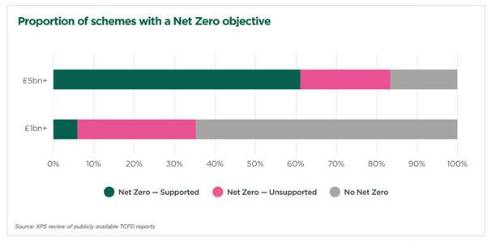Where reported, the average Implied Temperature Rise of scheme holdings was 2.80C, suggesting schemes are holdings assets which are not aligned to the climate transition
67% of £5bn+ schemes have now introduced climate-aware funds, and 61% are directly financing climate solutions
44% of £5bn+ schemes say they are not on track to meet the climate related targets they set in 2022
A new report by XPS Pensions Group reviewed the Task Force on Climate-Related Financial Disclosures (TCFD)-aligned climate disclosures of 35 pension schemes, totalling £344bn AUM, relating to schemes above £1bn. These are the second such round of TCFD disclosures published after reporting was made mandatory for schemes with over £5bn in 2021 and for schemes with over £1bn in 2022.
More of the largest schemes have a net zero target and a greater proportion, versus smaller schemes, have a clear plan to deliver on the target:

Progress is being made amongst schemes to manage climate risks, with most having made changes to their portfolio to include climate-aware objectives into their mandates and to finance climate solutions more directly. XPS’ view is that TCFD has been instrumental in bringing climate change to the attention of pension scheme trustees and is the first step to successfully managing climate risks.
There is still room for improvement though, with more focus needed on transition alignment beyond carbon emissions reduction where most of the attention is currently. XPS calculated a weighted average of reported Implied Temperature Rise of 2.8°C, indicating schemes are holding assets which are misaligned with the climate transition.
Furthermore, shortcomings have been highlighted in relation to stress testing the financial impacts of physical risks in a high global warming scenario. Additionally, as TCFD requires schemes to undertake scenario analysis every 3 years, the research found that 56% of £5bn+ schemes chose not to undertake analysis this year, and many of those who did undertake scenario modelling indicated that they did not find meaningful conclusions from the analysis.
The report concluded with four recommendations for scheme trustees including engaging in ongoing training to understand the latest TCFD developments, speaking to pensions consultants on enhancing their climate strategy, assessing the transition alignments across their portfolios and considering the increasing range of funds with embedded climate objectives.
Alex Quant, Head of ESG Research at XPS Pensions Group, said: “TCFD has been pivotal in bringing climate change to the attention of pension scheme trustees. Many schemes have made good progress to address climate risks in their portfolios, but the majority must place more focus on transition alignment in order to better contribute to real-world change.”
XPS Net Zero Report
|

